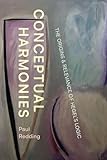Conceptual harmonies: The origins and relevance of Hegel's logic by Paul Redding.
Material type: TextLanguage: English Publisher: [2023]Description: xv, 286p. : illustrations ; 24 cmContent type:
TextLanguage: English Publisher: [2023]Description: xv, 286p. : illustrations ; 24 cmContent type: - text
- unmediated
- volume
- 9780226826059
- 9780226826073
- Origins and relevance of Hegel's logic
- B2949.L8 R39 2023
- R3xL70 R3
| Item type | Current library | Home library | Call number | Status | Barcode | |
|---|---|---|---|---|---|---|
 Textbook
Textbook
|
Central Library | Central Library | R3xL70 R3 (Browse shelf(Opens below)) | Available | CL1682064 |
Includes bibliographical references (pages 261-275) and index.
Logic Mathematics, and philosophy in fourth-century Athens -- Hegel and the Platonic origins of Aristotle's syllogistic -- The general significance of Neoplatonic harmonic theory for Hegel's account of magnitude -- Geometry and philosophy in Hegel, Schelling, Carnot and Grassmann -- The role of analysis situs in Leibniz's modernization of logic -- Hegel's supersession of Leibniz and Newton: the limitations of calculus and logical calculus -- Exploiting resources within Aristotle for the rehabilitation of the syllogism -- The return of Leibnizian logic in the Nineteenth Century: from Boole to Heyting -- Hegel among the new Leibnizians: Judgments -- Hegel beyond the new Leibnizians: Syllogisms.
"Supporters of G.W.F. Hegel's philosophy have largely shied away from relating his logic to modern symbolic or mathematical approaches. While it has predominantly been the non-Greek discipline of algebra that has informed modern mathematical logic, philosopher Paul Redding argues that the approaches of Plato and Aristotle to logic were deeply shaped by the arithmetic and geometry of classical Greek culture. And by ignoring the fact that Hegel's logic also has this deep mathematical dimension, conventional Hegelians have missed some of Hegel's greatest insights. In Conceptual Harmonies, Redding develops an account of Hegel's logic against a classical and modern historical background that is rarely considered. He stresses Hegel's attention to the Platonic background of Aristotle's original syllogistic and beyond. He then links these Platonic elements to Leibniz's modern revitalization of the logical tradition and then to new forms of algebraic geometry emerging in Hegel's lifetime. Redding thereby reestablishes aspects of Hegel's philosophy that are essential if Hegel is to be taken as a thinker relevant not only to contemporary philosophy, but also to current philosophical conceptions of logic"-- Provided by publisher.
There are no comments on this title.

